Ten Injured In Drone Attacks On Saudi Airport
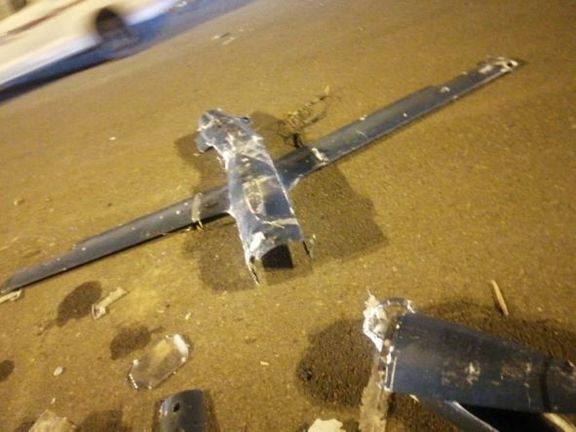
Ten people were injured in two explosives-laden drone attacks at King Abdullah airport in the southern Saudi city of Jizan late on Friday and early on Saturday.

Ten people were injured in two explosives-laden drone attacks at King Abdullah airport in the southern Saudi city of Jizan late on Friday and early on Saturday.
There was no immediate claim of responsibility by Iran-backed Houthis, who regularly launches drone and missile attacks targeting the gulf kingdom.
The latest attack comes as Saudi Arabia and Iran are engaged in talks to address tensions in their relations that have especially prevalent since they broke diplomatic ties five years ago.
Iran’s foreign minister Hossein Amir-Abdollahian in a visit to Lebanon on Thursday and Friday emphasized that the talks are on the right track and highlighted their importance for regional security.
Six Saudis, three Bangladeshi nationals and one Sudanese were injured in the first attack, Saudi state media said, citing a coalition spokesman. Some of the airport's facade windows were shattered in the attack, the spokesman said.
A second explosives-laden drone was intercepted early on Saturday, the coalition said, without giving details on any injuries or damages.
The military coalition intervened in Yemen in 2015, backing forces of the ousted government of President Abdrabbuh Mansur Hadi and fighting the Iran-aligned Houthi group.
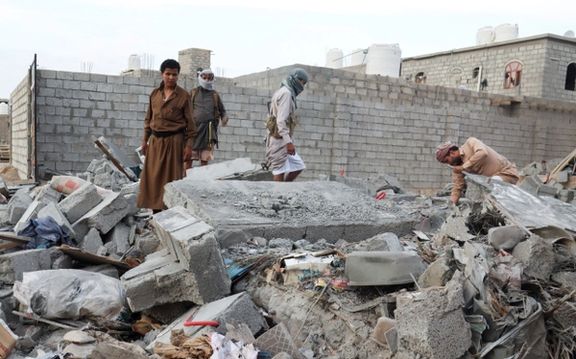
Recent statements from Iran and Saudi Arabia have provided hope that a pathway might be emerging to an end to the bitter seven-year civil war in Yemen.
The conflict has killed an estimated quarter of a million people and left millions more homeless.
On September 21, officials from Saudi Arabia and Iran – the Middle East’s two biggest powers and bitterest rivals – met at Baghdad airport for the fourth round of talks aimed at improving relations. Three other rounds of direct talks took place during the administration of moderate Iranian president Hassan Rouhani. There was a short hiatus in August while the new – and deeply conservative – president, Ebrahim Raisi, took office, but in recent weeks new momentum has been found.
Commenting at the beginning of October, Saudi minister of foreign affairs, Prince Faisal bin Farhan al-Saud, expressed the hope that the talks would “provide a basis to address unresolved issues between the two sides”. The following day, Iranian foreign ministry spokesman, Saeed Khatibzadeh, told reporters that all parties were “trying to start a sustainable relationship within a mutually beneficial framework”, adding that talks were “in their best state”.
The talks came just a month after the Baghdad International Conference for Cooperation and Participation brought representatives from Saudi Arabia, Iran, Turkey, Egypt and others together to discuss regional security concerns. Saudi Arabia and Iran are, of course, central to regional security, but have regularly found themselves on opposing sides of regional conflicts.
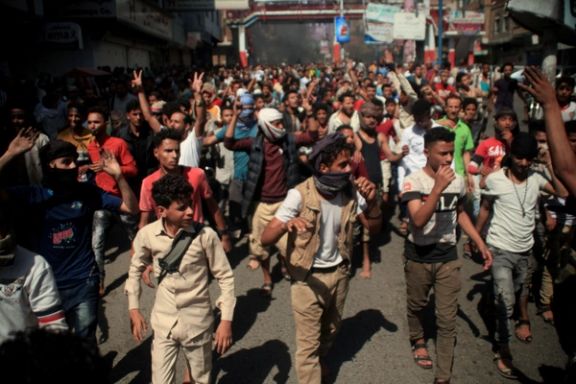
While tensions between the two states have been high, in recent years there has been an acceptance among Saudi officials that Riyadh’s confrontational policy towards Iran has failed. But a great deal of work needs to be done to address not only decades of animosity but also the practicalities of ending conflict in Yemen. The semi-regular prisoner swaps will only go so far towards achieving this.
While many date the rivalry between Saudi Arabia and Iran to the establishment of the Islamic Republic of Iran in 1979, tensions can be traced far earlier – reflecting a series of issues pertaining to geography and the treatment of minority groups. But the establishment of the Islamic Republic in Iran raised the pressure. The explicitly anti-monarchical vision of Iran’s supreme leader, Ruhollah Khomeini, didn’t help matters as Saudi Arabia’s ruling al-Saud family found themselves the subject of a great deal of criticism from Iran’s clerical leadership.
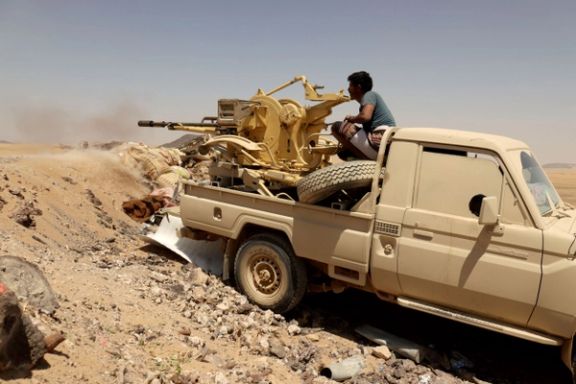
In the following decades, this rivalry has begun to play out in divided societies across the Middle East such as the “proxy arenas” of Bahrain, Iraq, Lebanon, and particularly Syria and Yemen, often with devastating results. But it has been the conflict in Yemen – a bitter struggle that until now has shown no sign of abating – which is the biggest concern. In Yemen the Saudi-backed Hadi military coalition has been at war with the Houthi rebel movement which receives funding from Iran but honed its military skills over two decades of conflict with the Yemeni government.
As Yemen watchers have observed, the war is actually comprised of a number of different conflicts. Central to this is a conflict between government forces and the Houthi movement, but adding to this complexity is the presence of a secessionist movement in the south of Yemen. There is also tribal competition in the east and competition between different branches of the military along the Red Sea coast. These groups receive varying levels of support from external powers, including Saudi Arabia, Iran and the UAE. These different fault lines in the conflict have mapped onto the geography of the state, facilitating its fragmentation.
A resolution of tensions between Saudi Arabia and Iran can have a dramatic impact across the region. Yet the interplay of regional and local politics means that fighting in Yemen can hinder any regional peace agreements. Meanwhile, tensions continue thanks to the provision of funding by regional powers to local groups in pursuit of increased influence.
As a consequence, a clear mechanism to build trust – and ultimately peace – is needed to bring about an end to fighting in Yemen. This mechanism is the subject of discussions between Saudi and Iranian officials – but reports suggest that proposals have been taken to senior Houthis in Yemen.
For Saudi Arabia, any peace with Iran is dependent on a cessation of attacks on its soil from Houthi missiles. This will require Iranian guarantees that Houthi attacks on the kingdom will end. It may also require the reopening of Sana’a airport, which currently remains under blockade. In return, Iranians expect Saudi Arabia to withdraw its opposition to the nuclear deal and a resumption of diplomatic relations.
But peacebuilding is never easy. Two days after the Saudi statement about the good progress of peace talks, the interception of ballistic missiles and “bomb-laden” drones launched by the Houthis towards Saudi Arabia highlighted just how precarious things are in Yemen. So there’s still a lot of work to be done, but – seemingly for the first time since this bitter conflict flared in 2014 – there is confidence on all sides that this bloody mess can be resolved.
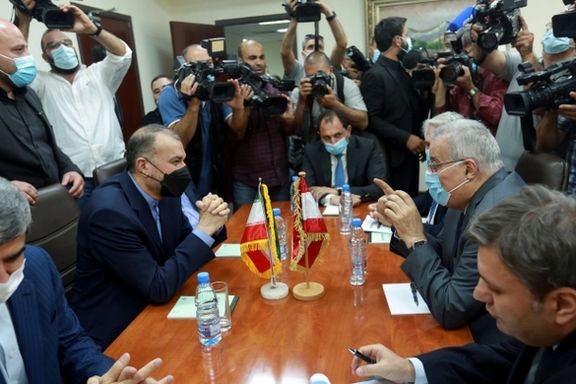
Iran wants to continue sending fuel to Lebanon and hopes for an agreement with Beirut, foreign minister Hossein Amir-Abdollahian said in Beirut on Friday.
The Tehran-backed Lebanese Shi'ite Hezbollah group has been co-ordinating Iranian fuel shipments to Lebanon since August despite United States sanctions threatening punitive action against buyers of Iranian oil sales. Lebanon faces acute shortages of gasoline and diesel − the latter widely used to generate electricity – after an economic meltdown including a collapsed Lebanese pound.
Amir-Abdollahian held talks with President Michel Aoun and Prime Minister Najib Mikati Thursday. Mikati has said the Iranian fuel shipments breach his country's sovereignty.
"At any point in time if the Lebanese government asks Iran formally within the context of their brotherly ties … Iran is ready to send fuel products," Amir-Abdollahian said at a news conference.
While Hezbollah has been happy to draw kudos its role in the fuel shipments – coming by truck from Baniyas port in Syria after arriving by sea – the party’s critics and opponents say it is usurping state authority.
“Broadly speaking, fuel from a country subject to extensive sanctions like Iran is not very clearly a sustainable solution to Lebanon’s energy crisis,” US State Department spokesman Ned Price told reporters in his briefing Thursday. “This is…Hezbollah playing a public-relations game, not engaged in constructive problem solving.”
Amir-Abdollahian said Friday that given the dire situation in Lebanon – where 75 percent of the population now live in poverty – he hoped the US would waive sanctions to allow Iran to help. However Iran itself faces a serious economic crisis, with little to spare and a population that resents expenditures in foreign countries.
Flouting sanctions
Sending fuel via Syria to Hezbollah, which it can sell partly on the open market to raise money, flouts a range of US sanctions against Syria, Hezbollah and Iran.
With Lebanon – where most political groups have regional affiliations – squeezed in recent years by tensions between Saudi Arabia and Iran, Amir-Abdollahian Friday reiterated Tehran’s commitment to further talks with Riyadh, which he said had been going in the right direction.
“We and Saudi Arabia have reached some agreements in certain areas, and we welcome these talks,” he said. “Our talks with Saudi Arabia benefit the region. Iran and Saudi Arabia are two important countries that play a vital role in guaranteeing security in the region.”
The new Iranian government of President Ebrahim Raisi (Raeesi) has been talking up the importance of developing diplomatic and economic relations with its neighbors. It has attached little urgency to restarting Vienna talks over resuming its 2015 nuclear deal with world powers, talks that were prioritized by the previous government of President Hassan Rouhani.
Amir-Abdollahian said Iran would not “not waste time with negotiations” if other parties were “not serious about resuming” the Vienna process. The foreign minister has said the onus remains with the US to lift the ‘maximum pressure’ sanctions that it imposed on Iran when it left the nuclear deal in 2018. The Vienna talks have been suspended since June, ostensibly pending the transition in Tehran.
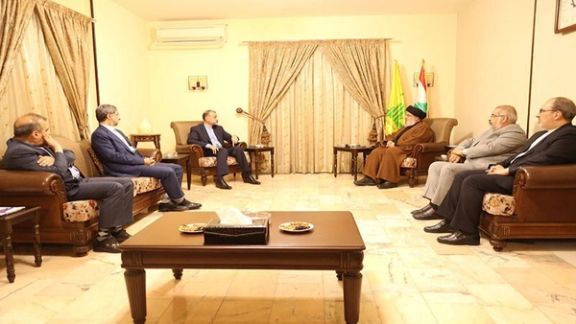
On the second day of his visit to Lebanon, Iran’s foreign minister Hossein Amir-Abdollahian met with the leader of Hezbollah, Hasan Nasrallah on Friday.
Reports by semi-official sources did not reveal many details about the meeting, except that the two sides praised one another and their mutual cooperation.
Amir-Abdollahian pledged full support for Lebanon, which is experiencing an unprecedented economic crisis. Iran recently shipped fuel to alleviate a serious shortage in Lebanon, but beyond that Tehran itself faces an economic crisis mainly because of US sanctions.
Nasrallah thanked the Islamic Republic of Iran for standing next to Lebanon and the “resistance forces”, a reference to Tehran’s allies and proxies in the region.
“Iran has proven that it is an honest and faithful friend, who does not leave its friends alone no matter how difficult circumstances might be,” the Hezbollah leader said.
Hezbollah, with overwhelming influence in Lebanon in the last decade, and traditional Lebanese politicians are blamed for the economic crisis that ensued in 2019, by repeated political deadlocks and factional discord.
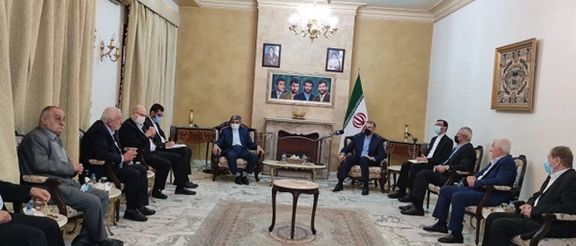
Iran's Foreign Minister in Beirut on Thursday met with officials of Palestinian groups and pledged Tehran's support for resistance against the "Zionist enemy".
Two of the most prominent Palestinians in the meeting were the leader of the Palestinian Islamic Jihad Ziyad al-Nakhalah, and senior Hamas member Osama Hamdan.
In his meeting with representatives of Palestinian groups at the Iranian embassy in Beirut,foreign minister Hossein Amir-Abdollahian said he had stressed in a meeting with the UN Secretary General Antonio Guterres in New York during the annual UN General Assembly summit that the Islamic Republic Supreme Leader Ali Khamenei and the Iranian people will continue to support the "resistance and Palestine until the liberation of all historical Palestinian lands and liberation of Al-Quds (Jerusalem) and Al-Aqsa Mosque."
He also described the “battle of Seif Al-Quds” (Sword of Jerusalem) -- clashes between Palestinians and the Israeli Police in May – as an extremely significant event. "These operations undercut the plan for normalization of [diplomatic] relations [between Arab countries and] the Zionist regime.
Islamic Republic’s support to militant groups in the region goes back to its establishment in 1979, when Iranian revolutionaries were quick to establish ties with various Palestinian and non-Palestinian militants. In the recent decade, with Iran’s full involvement in the Syrian and Yemeni civil wars, Iran’s policy of interference in regional countries has emerged, with Western governments demanding that Tehran change course.
Amir-Abdollahian had also met with leaders of Palestinian groups in Damascus on August 30 during his second regional trip after his appointment as foreign minister. These included Talal Naji, secretary-general of the Popular Front for the Liberation of Palestine, Khalid Abdal Majid, secretary-general of the Palestinian Popular Front, Abu Saeed Al-Maniawi, senior Palestinian Islamic Jihad official, and officials of the Democratic Front for the Liberation of Palestine and Palestinian National Liberation Movement. "If it were not for the support of the Islamic Republic of Iran, the victories of the resistance axis in Lebanon, Syria, Iraq, and Yemen would not have been realized today," Naji told reporters after the meeting.
The Iranian foreign minister on Thursday held a flurry of separate meeting with top Lebanese officials including President Michel Aoun, a key ally of the Iran-backed Lebanese Hezbollah, Parliament Speaker Nabih Berri, the recently appointed Prime Minister Najib Mikati, and Foreign Minister Abdullah Bou Habib. On Thursday he also visited the Supreme Islamic Shia Council of Lebanon where he met with the family of the late Musa al-Sadr, the Iranian-born Lebanese scholar and political leader who founded the Amal Movement in 1974.
In a news conference after his meeting with Lebanese officials Thursday, Amir-Abdollahian said if asked by the Lebanese government, Iran would be willing to participate in the rebuilding of the port of Beirut which was destroyed in a massive explosion in August 2020 as well as two power plants, one in Beirut and another one in south Lebanon within a year and a half.
On Wednesday dozens of Lebanese citizens rallied in Beirut ahead of the Iranian foreign minister's visit to protest what they said is Iran's growing influence in Lebanon.
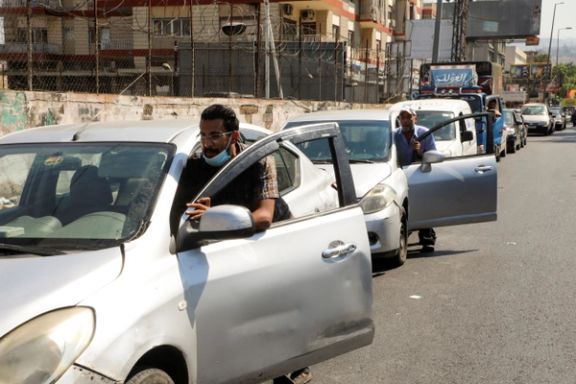
Jordan hopes to start supplying power-starved Lebanon with electricity by the end of the year, its energy minister said on Thursday.
The Lebanese government tries to tackle its crippling energy shortages amid the country's financial meltdown.
Hala Zawati told Sky News Arabia that Lebanon was seeking World Bank financing for the project, part of efforts backed by the United States to address Lebanon's energy crisis.
Under an agreement announced last month, Egypt will supply natural gas to Lebanon via a pipeline that passes through Jordan and Syria to help boost Lebanon's electricity output.
The plan also involves using Egyptian gas to generate electricity in Jordan for transmission to Lebanon via the Syrian power grid.
U.S. senators visiting Lebanon last month said they were seeking ways to address the complicating factor of U.S. sanctions on Syria.
Iranian Foreign Minister Hossein Amir-Abdollahian said in Beirut on Thursday that Iran was ready to build two power plants in Lebanon, one in Beirut and the other in the south of the country, over a period of 18 months.
Iran backs the heavily armed, Lebanese Shi'ite group Hezbollah, deemed a terrorist group by the United States.
"We are completely ready to accomplish this project using the Islamic Republic of Iran's technical expertise, and benefiting from joint Iranian-Lebanese investment," he said, speaking via an Arabic translator.
He did not say who the investors could be. Iran itself is suffering from power shortages.
Reporting by Reuters